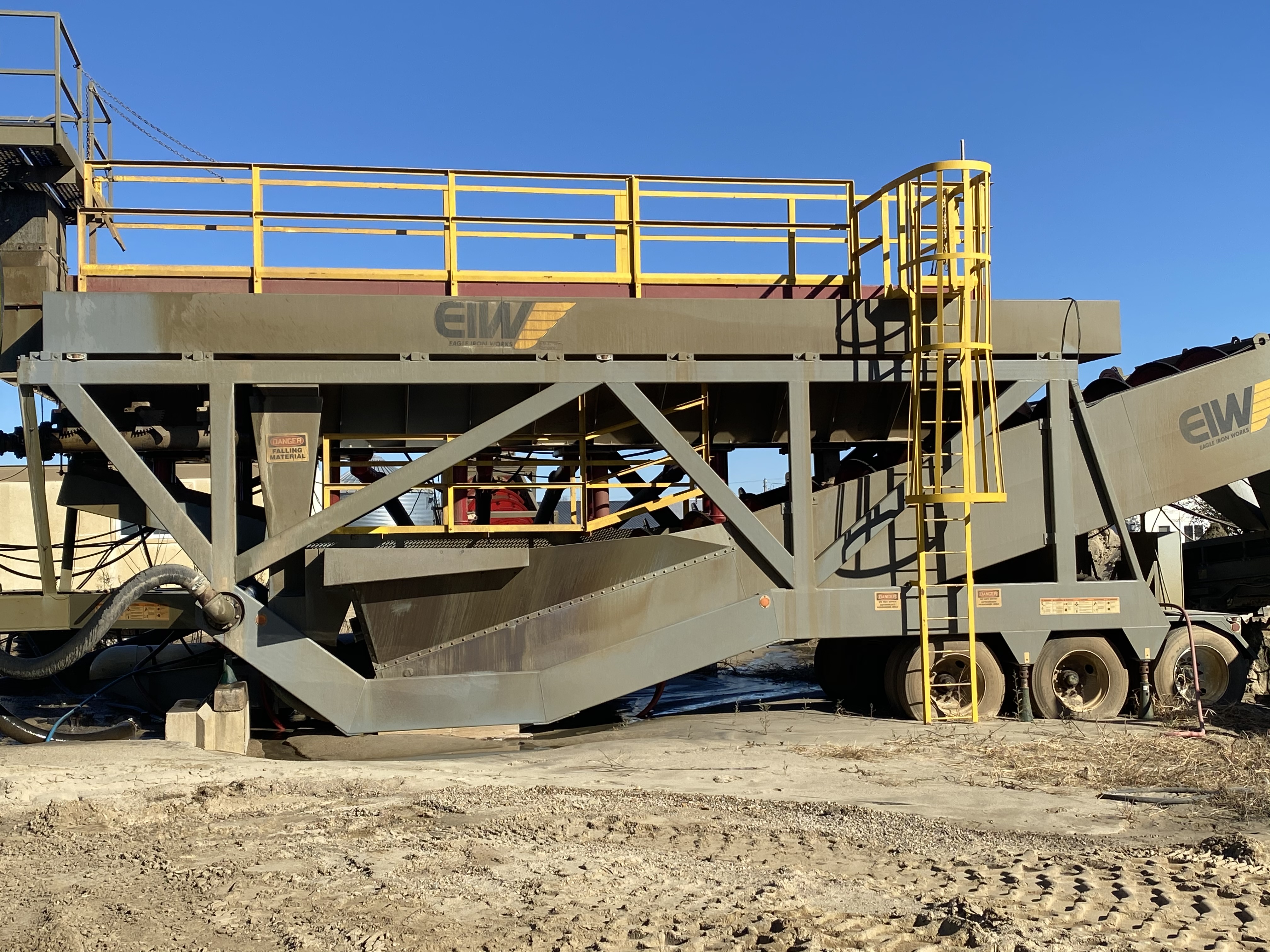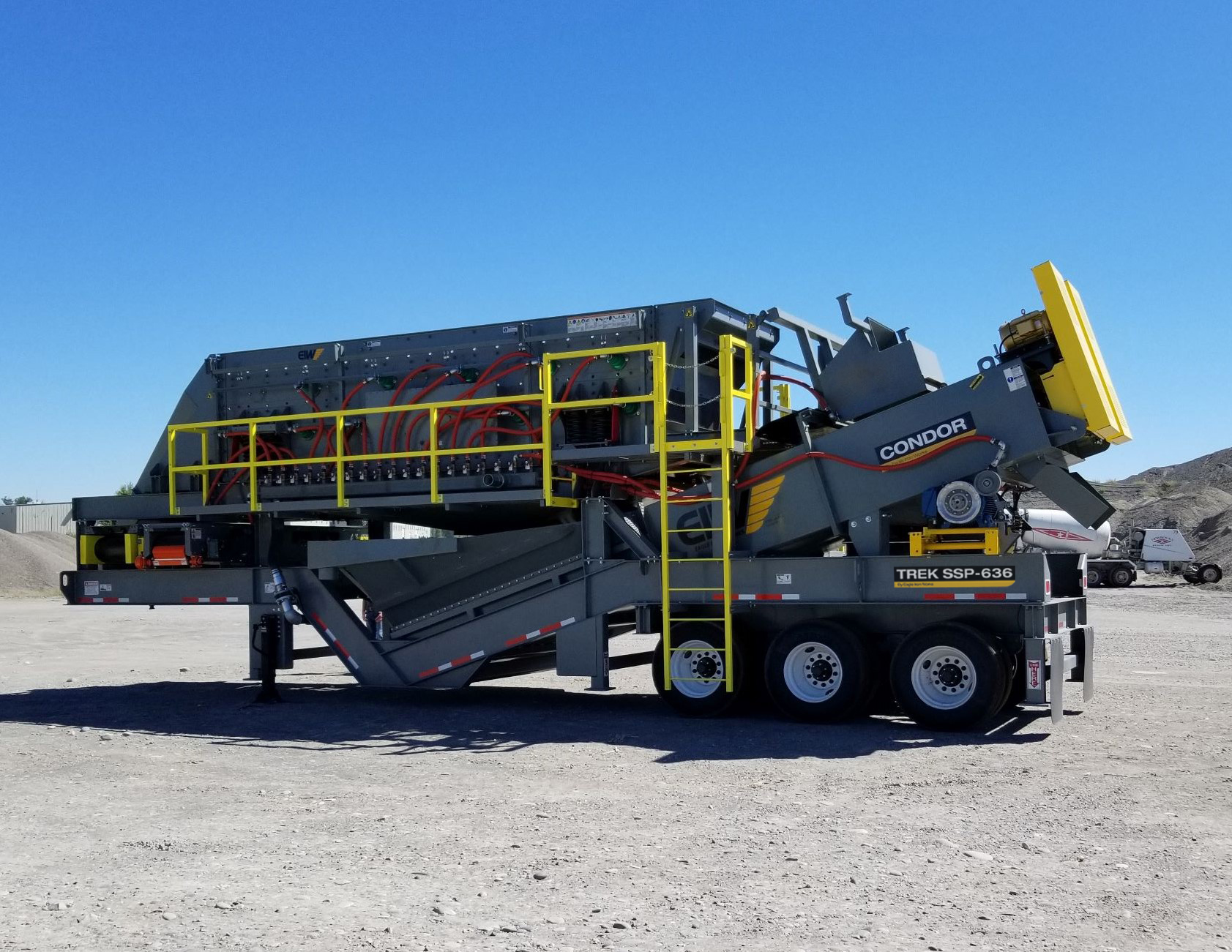
Portable Wash Plants: When, Where and Why to Use Them
Portable sand and gravel washing plants are becoming increasingly popular due to their flexibility and mobility. They offer producers the ability to move their washing operation where and when they need it in a short amount of time and without needing to bring in large cranes.

An Eagle Trek Portable Tank Screw Plant (TSP), consisting of an EIW Water-Scalping Classifying Tank and an EIW Fine Material Washer on a chassis, washes and classifies sand at a ready mix plant in Iowa.
What is a Portable Wash Plant?
Portable Wash Plants consist of traditional aggregate washing equipment neatly and conveniently housed on a Department of Transportation-approved chassis. A fifth-wheel kingpin on the chassis allows the portable plant to be attached to and hauled by a semi or tractor-trailer truck. Brakes, lighting package and landing jacks are all included as part of the main frame. Walkways and ladder access are also included for plant inspections/maintenance.
Designed with well-known, field-proven equipment, Portable Wash Plants offer the same washing capabilities as their stationary counterparts. These units are available in several different configurations but typically include a washing device such as a sand screw or Fine Material Washer. Common configurations include:
- Sand classifying tank and screw washer
A sand classifying tank removes excess water from the feed and discharges one primary and one secondary product or two primary products to a divided screw washer located directly beneath it on the chassis.
- Vibrating screen and screw washer
A multi-deck vibrating screen separates the feed into two or more product sizes, discharging the larger aggregate material to static or radial conveyors and the fine material to a sand screw washer located directly beneath it on the chassis.

An Eagle Trek Screen Screw Plant (SSP), consisting of a Horizontal Sizing Screen and Fine Material Washer, arrives on site in Idaho. In transport mode (shown here), the feed box to the screen is folded down, the screen motor is tucked under the discharge end of the screw and the control panel is mounted on a removable skid. For operation, the feed box will need to be folded into position, the screen motor will need to be installed, and the control panel will need to be set on the ground on one side of the plant.
Benefits of Portable Wash Plants
Portable Wash Plants offer several benefits, the first of which is the most obvious – portability. These plants are designed to go where production is needed, whether that be from a pit or quarry in one town to a pit or quarry in another town, or just around to different locations on the same site.
Quicker setup and teardown
Another benefit of portable plants is quicker setup. Because water lines and electrical hookups are all included, portable plants can be up and running within hours, depending on the site. Teardown time is also minimal, meaning you can be on the way to your new location in no time.
Less cost
Having a portable plant to move from site to site means you don’t have to own two sets of the same equipment. This not only saves you money on the initial capital cost – purchasing one plant instead of purchasing one plant for each site, but it also provides a cost-savings when it comes to maintenance and scheduled repairs.

Who should consider a portable plant?
Portable plants are a great option for those with multiple locations or deposits with shorter lifespans where a large stationary plant doesn’t make sense financially. Portable plants can be set up and torn down in the minimal amount of time, and they can save a producer from owning two sets of equipment and the subsequent costs associated with maintaining those two sets of equipment.
While portable plants offer many benefits, they are not a solution for every site. Portable plants are limited in their throughput due to size requirements for fitting on a chassis that meets transportation height and width guidelines. If you need help determining if a portable plant is the right option for your application, contact your local Eagle Iron Works dealer to discuss your site, goals and production requirements.

